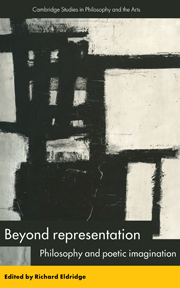Book contents
- Frontmatter
- Contents
- List of contributors
- Editor's acknowledgments
- 1 Introduction: from representation to poiesis
- 2 Confession and forgiveness: Hegel's poetics of action
- 3 The values of articulation: aesthetics after the aesthetic ideology
- 4 In their own voice: philosophical writing and actual experience
- 5 Poetry and truth-conditions
- 6 Fractal contours: chaos and system in the Romantic fragment
- 7 The mind's horizon
- 8 Kant, Hölderlin, and the experience of longing
- 9 Wordsworth and the reception of poetry
- 10 Self-consciousness, social guilt, and Romantic poetry: Coleridge's Ancient Mariner and Wordsworth's Old Pedlar
- 11 Her blood and his mirror: Mary Coleridge, Luce Irigaray, and the female self
- 12 Scene: an exchange of letters
- Index
4 - In their own voice: philosophical writing and actual experience
Published online by Cambridge University Press: 06 July 2010
- Frontmatter
- Contents
- List of contributors
- Editor's acknowledgments
- 1 Introduction: from representation to poiesis
- 2 Confession and forgiveness: Hegel's poetics of action
- 3 The values of articulation: aesthetics after the aesthetic ideology
- 4 In their own voice: philosophical writing and actual experience
- 5 Poetry and truth-conditions
- 6 Fractal contours: chaos and system in the Romantic fragment
- 7 The mind's horizon
- 8 Kant, Hölderlin, and the experience of longing
- 9 Wordsworth and the reception of poetry
- 10 Self-consciousness, social guilt, and Romantic poetry: Coleridge's Ancient Mariner and Wordsworth's Old Pedlar
- 11 Her blood and his mirror: Mary Coleridge, Luce Irigaray, and the female self
- 12 Scene: an exchange of letters
- Index
Summary
In contemplating the prospect of having to undergo Congressional scrutiny in connection with her confirmation as director of the National Endowment for the Arts, the esteemed actress, Jane Alexander, said – half in jest and half as boast – “It's the first time I've had to audition for an awfully long time.” She had attained that level of professional acclaim where those with parts to give out came to her, hoping she would consider accepting them, knowing her participation in a play would enhance its success, as art and as enterprise. There are those in philosophy of whom something like this is true as well, who do little or nothing by way of writing “on spec,” but nearly always in response to requests to give keynote addresses, symposium papers, named lectures, invited papers, contributed essays – and whose books themselves are often simply gatherings of these. Donald Davidson once told me that of the then close to forty papers he had published, none had been refereed – none had been submitted for publication and subjected to the processes of editorial or peer review, and exposed to requests for revision. Instead, those parts of his papers which an editor might peremptorily have written “Clarify!!!” next to in the margin have given rise to mighty rivers of commentary and analysis, and doubtless have seen more than one critic through to tenure as a specialist in the philosophy of Donald Davidson. There are exceptions, some surprising, but what is true for Davidson is in large measure true for philosophers of any reputation to speak of.
- Type
- Chapter
- Information
- Beyond RepresentationPhilosophy and Poetic Imagination, pp. 90 - 106Publisher: Cambridge University PressPrint publication year: 1996
- 2
- Cited by



